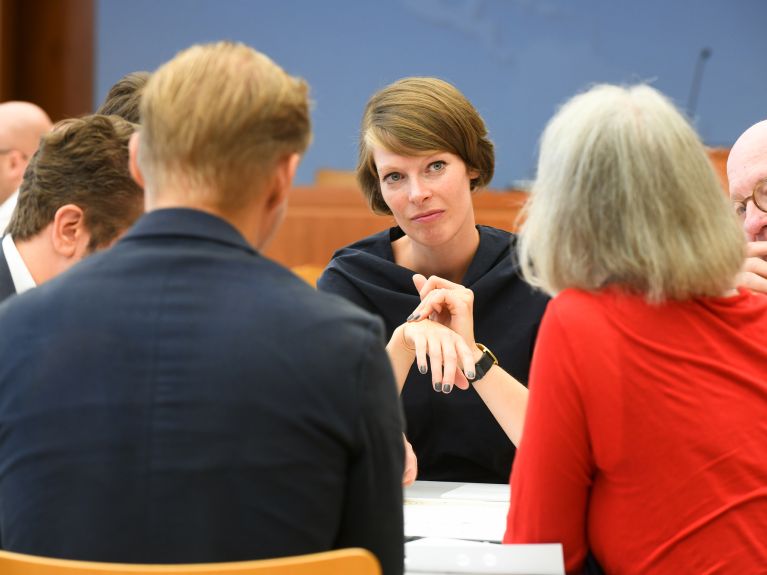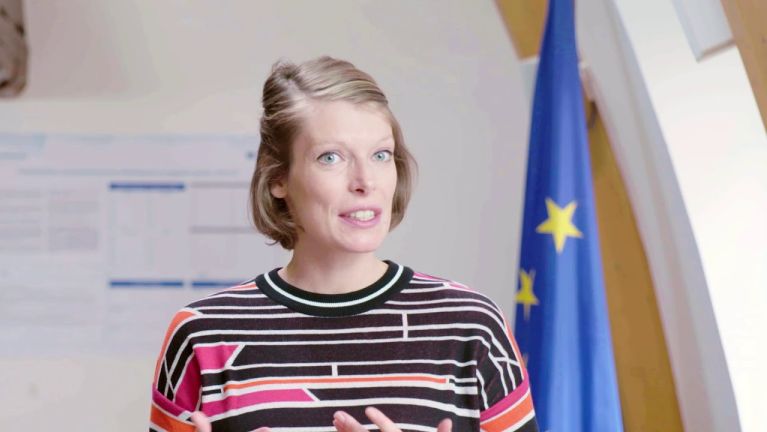“Solidarity doesn’t just fall into your lap”
Linn Selle is a committed European. As President of the European Movement Germany (EBD) she calls for more political action to promote a united Europe.

She is a lobbyist in the best possible sense: Linn Selle makes the case for Europe. Since 2018, the 33-year-old has been President of the European Movement Germany (EBD). The EBD is the largest German network for European politics.
Ms. Selle, the EBD turned 70 last year. When it was founded in 1949 the main objective was to raise awareness of the idea of a united Europe. What is your central task now?
The EBD is supported by around 250 organizations, which include unions, syndicates, associations – a broad cross section of pro-European society. We are the intermediaries between this organised segment of society and the political system. On top of that we bring European policy closer to Berlin – for example by holding information events for our members with correspondents from the EU Parliament, because not all organisations have an office in Brussels. A third pillar of our work is lobbying for a democratic, pluralistic and united Europe and a European Germany.
Dieses YouTube-Video kann in einem neuen Tab abgespielt werden
YouTube öffnenThird party content
We use YouTube to embed content that may collect data about your activity. Please review the details and accept the service to see this content.
Open consent formYou say that the EBD reflects the “pro-European common consensus” in Germany. What do you base the existence of this common consensus on – and are you worried about its continued existence?
In Eurobarometer surveys, around 80 percent of Germans say that they believe Europe to be a good thing. What’s more, the participation in the European elections has gone up. Contrary to the gloomy predictions that were made, the Euro-sceptic parties have not particularly profited from this trend. In Germany we have a silent majority that is pro-European. The sceptical minority on the other hand is very vocal and very well organised.
We are still waiting for the ‘new departure for Europe’.
In the person of Ursula von der Leyen a President of the European Commission has been sworn in this January who was not previously the leading candidate of a party. What consequences does that have when it comes to the acceptance of the democratic processes within the EU?
A Brussels journalist has described very fittingly that Ursula von der Leyen is not a bad choice, but that the way in which she was elected was highly regrettable. It left a sour taste with many who dedicate themselves to the European cause. Europe would have had the chance to show that by giving their vote for a party, voters are choosing a specific candidate. The fact that things turned out differently is very unfortunate.
Germany will assume the EU Council Presidency in mid-2020. What opportunities does this offer?
The opportunity to shape the European agenda once more and to raise awareness in the general population of important issues even beyond 2020. It would be a good look for Germany to once more assume the role of the “instigator”, which it has somewhat lost recently. Most notably against the backdrop of a “new departure for Europe” even forming part of the title of the coalition agreement between the two ruling parties in Germany. We are still waiting for this departure.
What would the German Council Presidency need to do in order to accomplish this “new departure”? What are the main topics it should address?
From our point of view there are first and foremost two important topics: Firstly, the negotiations concerning the multi-year financial framework that must be concluded under the German Council Presidency. Secondly, the conference on the future of Europe that was announced in late 2019. The Treaty of Lisbon is now ten years old, and the world has changed since it entered into force.
Without European rule of law the free economy doesn’t work either.
The EBD also insists that Germany stands up for greater respect for values and basic rights.
Much too often we hear that values would be “nice to have”, but that in the end the economy is what it’s all about. This falls short of the mark. Without European rule of law, the free market economy doesn’t work either. This is why the EU institutions must consistently apply the mechanism of state law and the proposition of a monitoring must be expedited.
And lastly a personal question: Much is being said nowadays about how people’s imagination can be captured for the European project. How did you become a fan of Europe?
I grew up on the Dutch-German border, and even as children we spent time on both sides, so it seemed normal to me. Later I realised that European solidarity is not a given. Many people work hard every day for Germany to remain pro-European and Europe to remain democratic. If we didn’t do this work, thing might turn out differently – and that’s not an option.
Linn Selle holds a PhD in Political Sciences, having studied at Viadrina European University among others. Her main job is at the Federation of German Consumer Organisations (Verbraucherzentrale Bundesverband).



